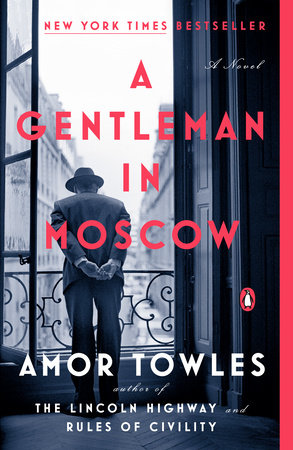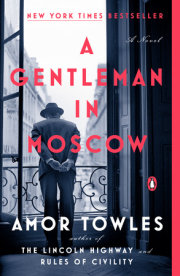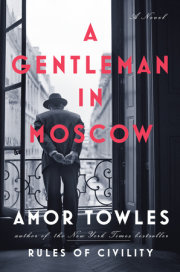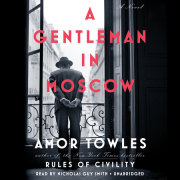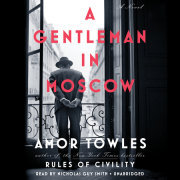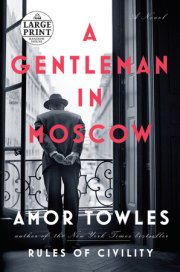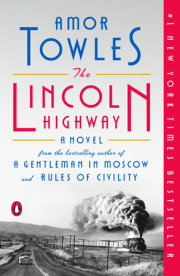From A Gentleman in Moscow:There were two restaurants in the Hotel Metropol: the Boyarsky, that fabled retreat on the second floor that we have already visited, and the grand dining room off the lobby known officially as the Metropol, but referred to affectionately by the Count as the Piazza.
Admittedly, the Piazza could not challenge the elegance of the Boyarsky’s décor, the sophistication of its service, or the subtlety of its cuisine. But the Piazza did not aspire to elegance, service, or subtlety. With eighty tables scattered around a marble fountain and a menu offering everything from cabbage piroghi to cutlets of veal, the Piazza was meant to be an extension of the city—of its gardens, markets, and thorough fares. It was a place where Russians cut from every cloth could come to linger over coffee, happen upon friends, stumble into arguments, or drift into dalliances—and where the lone diner seated under the great glass ceiling could indulge himself in admiration, indignation, suspicion, and laughter without getting up from his chair.
And the waiters? Like those of a Parisian café, the Piazza’s waiters could best be complimented as “efficient.” Accustomed to navigating crowds,they could easily seat your party of eight at a table for four. Having noted your preferences over the sound of the orchestra, within minutes they would return with the various drinks balanced on a tray and dispense them round the table in rapid succession without misplacing a glass. If, with your menu in hand, you hesitated for even a second to place your order, they would lean over your shoulder and poke at a specialty of the house. And when the last morsel of dessert had been savored, they would whisk away your plate, present your check, and make your change in under a minute. In other words, the waiters of the Piazza knew their trade to the crumb, the spoon, and the kopek.
At least, that was how things were before the war. . . .
Today, the dining room was nearly empty and the Count was being served by someone who appeared not only new to the Piazza, but new to the art of waiting. Tall and thin, with a narrow head and superior demeanor, he looked rather like a bishop that had been plucked from a chessboard. When the Count took his seat with a newspaper in hand—the international symbol of dining alone—the chap didn’t bother to clear the second setting; when the Count closed his menu and placed it beside his plate—the international symbol of readiness to order—the chap needed to be beckoned witha wave of the hand; and when the Count ordered the okroshka and filet of sole, the chap asked if he might like a glass of Sauterne. A perfect suggestion, no doubt, if only the Count had ordered foie gras!
“Perhaps a bottle of the Châteaude Baudelaire,” the Count corrected politely.
“Of course,” the Bishop replied with an ecclesiastical smile.
Granted, a bottle of Baudelaire was something of an extravagance for a solitary lunch, but after spending another morning with the indefatigable Michel de Montaigne, the Count felt that his morale could use the boost. For several days, in fact, he had been fending off a state of restlessness. On his regular descent to the lobby, he caught himself counting the steps. As he browsed the headlines in his favorite chair, he found he was lifting his hands to twirl the tips of moustaches that were no longer there. He found he was walking through the door of the Piazza at 12:01 for lunch. And at 1:35, when he climbed the 110 steps to his room, he was already calculating the minutes until he could come back downstairs for a drink. If he continued along this course, it would not take long for the ceiling to edge downward, the walls to edge inward, and the floor to edge upward, until the entire hotel had been collapsed into the size of a biscuit tin.
As the Count waited for his wine, he gazed around the restaurant, but his fellow diners offered no relief. Across the way was a table occupied by two stragglers from the diplomatic corps who picked at their food while they awaited an era of diplomacy. Over there in the corner was a spectacled denizen of the second floor with four enormous documents spread across his table, comparing them word for word. No one appeared particularly gay; and no one paid the Count any mind. That is, except for the young girl with the penchant for yellow who appeared to be spying on him from her table behind the fountain. According to Vasily, this nine-year-old with straight blond hair was the daughter of a widowed Ukrainian bureaucrat. As usual, she was sitting with her governess. When she realized the Count was looking her way, she disappeared behind her menu.
“Your soup,” said the Bishop.“Ah. Thank you, my good man. It looks delicious. But don’t forget the wine!”
“Of course.”
Turning his attention to his okroshka, the Count could tell at a glance that it was a commendable execution—a bowl of soup that any Russian inthe room might have been served by his grandmother. Closing his eyes in order to give the first spoonful its due consideration, the Count noted asuitably chilled temperature, a tad too much salt, a tad too little kvass, but a perfect expression of dill—that harbinger of summer which brings to mind the songs of crickets and the setting of one’s soul at ease.
But when the Count opened his eyes, he nearly dropped his spoon. For standing at the edge of his table was the young girl with the penchant for yellow—studying him with that unapologetic interest peculiarto children and dogs. Adding to the shock of her sudden appearance was the fact that her dress today was in the shade of a lemon.
“Where did they go?” she asked, without a word of introduction.
“I beg your pardon. Where did who go?”
She tilted her head to take a closer look at his face.
“Why, your moustaches.”
The Count had not much cause to interact with children, but he had been raised well enough to know that a child should not idly approach a stranger, should not interrupt him in the middle of a meal, and certainly should not ask him questions about his personal appearance. Was the minding of one’s own business no longer a subject taught in schools?
“Like swallows,” the Count answered, “they traveled elsewhere for the summer."
Then he fluttered a hand from the table into the air in order to both mimic the flight of the swallows and suggest how a child might follow suit.
She nodded to express her satisfaction with his response.
“I too will be traveling elsewhere for part of the summer.”
The Count inclined his head to indicate his congratulations.
“To the Black Sea,” she added.
Then she pulled back the empty chair and sat.
“Would you like to join me?” he asked.
By way of response, she wiggled back and forth to make herself comfortable then rested her elbows on the table. Around her neck hung a small pendant on a golden chain, some lucky charm or locket. The Count looked toward the young lady’s governess with the hopes of catching her attention, but she had obviously learned from experience to keep her nose in her book.
The girl gave another canine tilt to her head.
“Is it true that you are a count?”
“’Tis true.”
Her eyes widened.
“Have you ever known a princess?”
“I have known many princesses.”
Her eyes widened further, then narrowed.
“Was it terribly hard to be a princess?”
“Terribly.”
At that moment, despite the fact that half of the okroshka remained in its bowl, the Bishop appeared with the Count’s filet of sole and swapped one for the other.
“Thank you,” said the Count, his spoon still in hand.
“Of course.”
The Count opened his mouth to inquire as to the whereabouts of the Baudelaire, but the Bishop had already vanished. When the Count turned back to his guest, she was staring at his fish.
“What is that?” she wanted to know.
“This? It is filet of sole.”
“Is it good?”
“Didn’t you have a lunch of your own?”
“I didn’t like it.”
The Count transferred a taste of his fish to a side plate and passed it across the table. “With my compliments.”
She forked the whole thing in her mouth.
“It’s yummy,” she said, which if not the most elegant expression was at least factually correct. Then she smiled a little sadly and let out a sigh as she directed her bright blue gaze upon the rest of his lunch.
“Hmm,” said the Count.
Retrieving the side plate, he transferred half his sole along with an equal share of spinach and baby carrots, and returned it. She wiggled back and forth once more, presumably to settle in for the duration. Then, having carefully pushed the vegetables to the edge of the plate, she cut her fish into four equal portions, put the right upper quadrant in her mouth, and resumed her line of inquiry.
“How would a princess spend her day?”
“Like any young lady,” answered the Count.
With a nod of the head, the girl encouraged him to continue.
“In the morning, she would have lessons in French, history, music. After her lessons, she might visit with friends or walk in the park. And at lunch she would eat her vegetables.”
“My father says that princesses personify the decadence of a vanquished era.”
The Count was taken aback.
“Perhaps a few,” he conceded. “But not all, I assure you.”
She waved her fork.
“Don’t worry. Papa is wonderful and he knows everything there is to know about the workings of tractors. But he knows absolutely nothing about the workings of princesses.”
The Count offered an expression of relief.
“Have you ever been to a ball?” she continued after a moment of thought.
“Certainly.”
“Did you dance?”
“I have been known to scuff the parquet.” The Count said this with the renowned glint in his eye—that little spark that had defused heated conversations and caught the eyes of beauties in every salon in St. Petersburg.
“Scuff the parquet?”
“Ahem,” said the Count. “Yes, I have danced at balls.”
“And have you lived in a castle?”
“Castles are not as common in our country as they are in fairy tales,” the Count explained. “But I have
dined in a castle. . . .”
Accepting this response as sufficient, if not ideal, the girl now furrowed her brow. She put another quadrant of fish in her mouth and chewed thoughtfully. Then she suddenly leaned forward.
“Have you ever been in a duel?”
“An affaire d’honneur?” The Count hesitated. “I suppose I have been in a duel of sorts. . . .”
“With pistols at thirty-two paces?”
“In my case, it was more of a duel in the figurative sense.”
When the Count’s guest expressed her disappointment at this unfortunate clarification, he found himself offering a consolation:
“My godfather was a second on more than one occasion.”
“A second?”
“When a gentleman has been offended and demands satisfaction on the field of honor, he and his counterpart each appoint seconds—in essence, their lieutenants. It is the seconds who settle upon the rules of engagement.”
“What sort of rules of engagement?”
“The time and place of the duel. What weapons will be used. If it is to be pistols, then how many paces will be taken and whether there will be more than one exchange of shots.”
“Your godfather, you say. Where did
he live?”
“Here in Moscow.”
“Were his duels in Moscow?”
“One of them was. In fact, it sprang from a dispute that occurred in this hotel—between an admiral and a prince. They had been at odds for quite some time, I gather, but things came to a head one night when their paths collided in the lobby, and the gauntlet was thrown down on that very spot.”
“Which very spot?”
“By the concierge’s desk.”
“Right where I sit!”
“Yes, I suppose so.”
“Were they in love with the same woman?”
“I don’t think a woman was involved.”
The girl looked at the Count with an expression of incredulity.
“A woman is always involved,” she said.
“Yes. Well. Whatever the cause, an offense was taken followed by a demand for an apology, a refusal to provide one, and a slap of the glove. At the time, the hotel was managed by a German fellow named Keffler, who was reputedly a baron in his own right. And it was generally known that he kept a pair of pistols hidden behind a panel in his office, so that when an incident occurred, seconds could confer in privacy, carriages could be summoned, and the feuding parties could be whisked away with weapons in hand.”
“In the hours before dawn . . .”
“In the hours before dawn.”
“To some remote spot . . .”
“To some remote spot.”
She leaned forward.
“Lensky was killed by Onegin in a duel.”
She said this in a hushed voice, as if quoting the events of Pushkin’s poem required discretion.
“Yes,” whispered back the Count. “And so was Pushkin.”
She nodded in grave agreement.
“In St. Petersburg,” she said. “On the banks of the Black Rivulet.”
“On the banks of the Black Rivulet.”
The young lady’s fish was now gone. Placing her napkin on her plate and nodding her head once to suggest how perfectly acceptable the Count had proven as a luncheon companion, she rose from her chair. But before turning to go, she paused.
“I prefer you without your moustaches,” she said. “Their absence improves your . . . countenance.”
Then she performed an off-kilter curtsey and disappeared behind the fountain.
Copyright © 2016 by Amor Towles. All rights reserved. No part of this excerpt may be reproduced or reprinted without permission in writing from the publisher.

